10 Bedroom Plants to Improve Health and Wellness: Sleep Better with Air-Purifying Greenery
Your bedroom should be more than just a place to sleep—it should be a sanctuary for rest, health, and overall wellness. While soft bedding and calming colors help, the air you breathe makes the biggest difference. Certain plants are proven to filter toxins, improve air quality, and even reduce stress levels that interfere with sleep. The best part? Most of them are easy to care for.
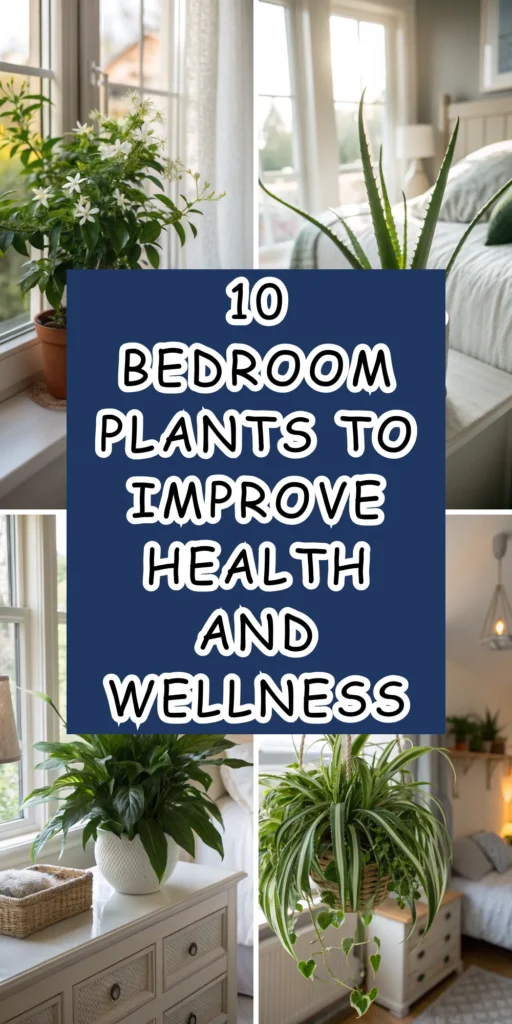
Here are 10 of the best bedroom plants that bring beauty, health, and better sleep into your space.
Snake Plant (Sansevieria)
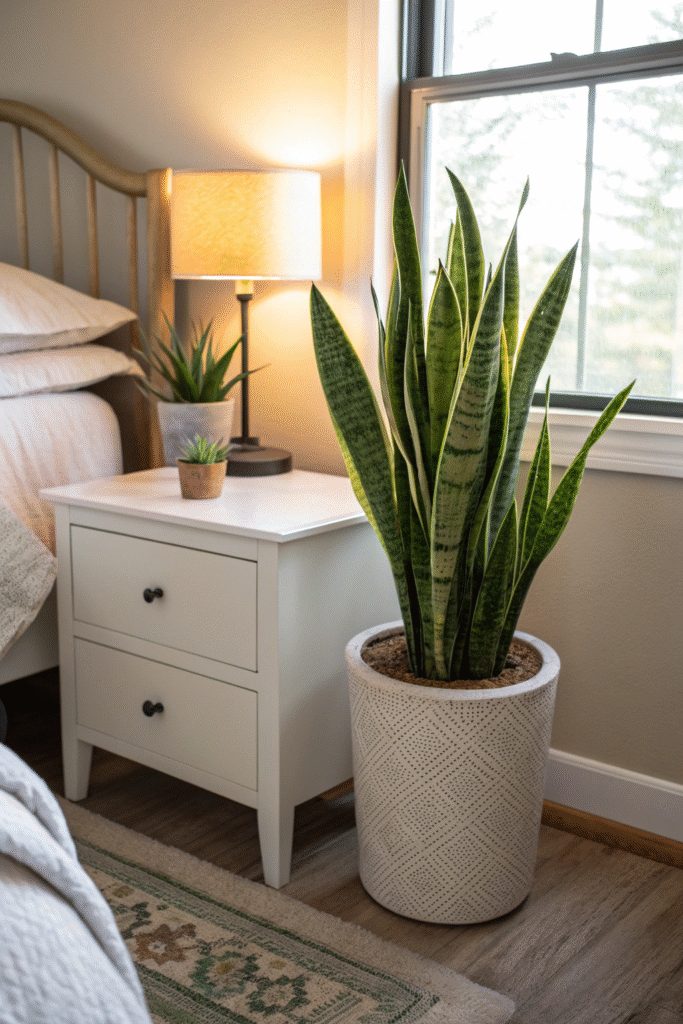
The snake plant is often called “mother-in-law’s tongue,” and it’s one of the most recommended plants for bedrooms. Unlike most plants that release oxygen during the day, the snake plant also produces oxygen at night—helping improve air quality while you sleep.
- Health benefits: Filters out toxins like benzene, xylene, and formaldehyde. Boosts nighttime oxygen levels.
- Care: Extremely low-maintenance; thrives in low to bright indirect light. Water only when the soil is dry.
- Bedroom fit: Great for corners or small spaces since it grows upright without taking up much room.
Peace Lily
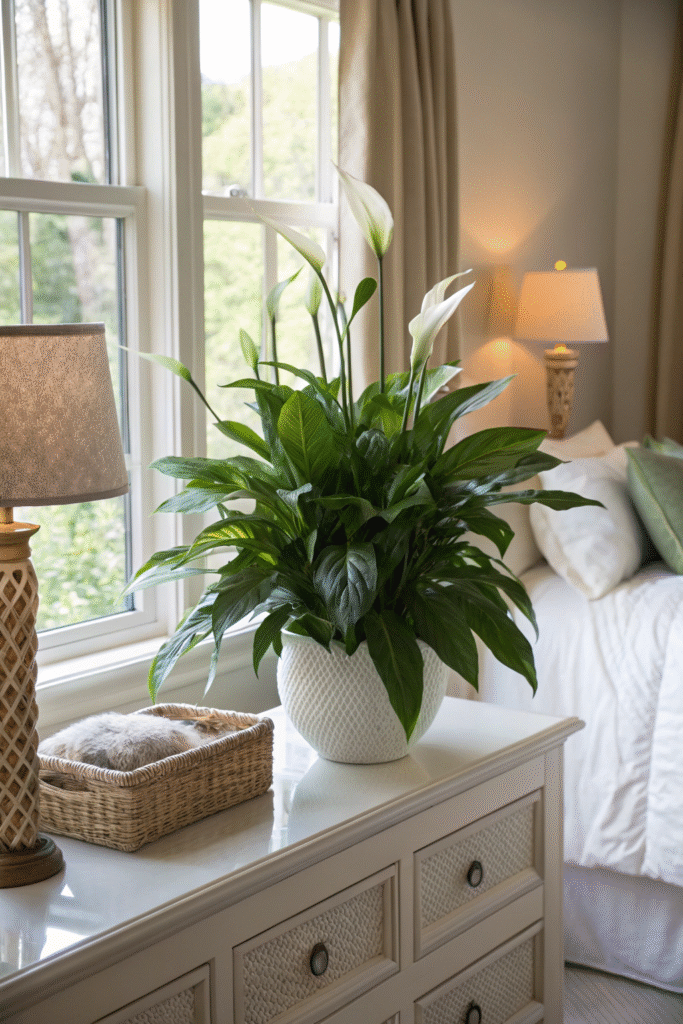
Peace lilies are known for their striking white blooms, but they’re more than decorative. They improve humidity levels in the air, which can ease dry skin, sinus issues, and nighttime coughing.
- Health benefits: Removes toxins like ammonia and trichloroethylene. Naturally humidifies the air.
- Care: Prefers medium, indirect light. Keep soil consistently moist but not soggy.
- Bedroom fit: Adds elegance and freshness; best on dressers or nightstands with natural light.
Lavender
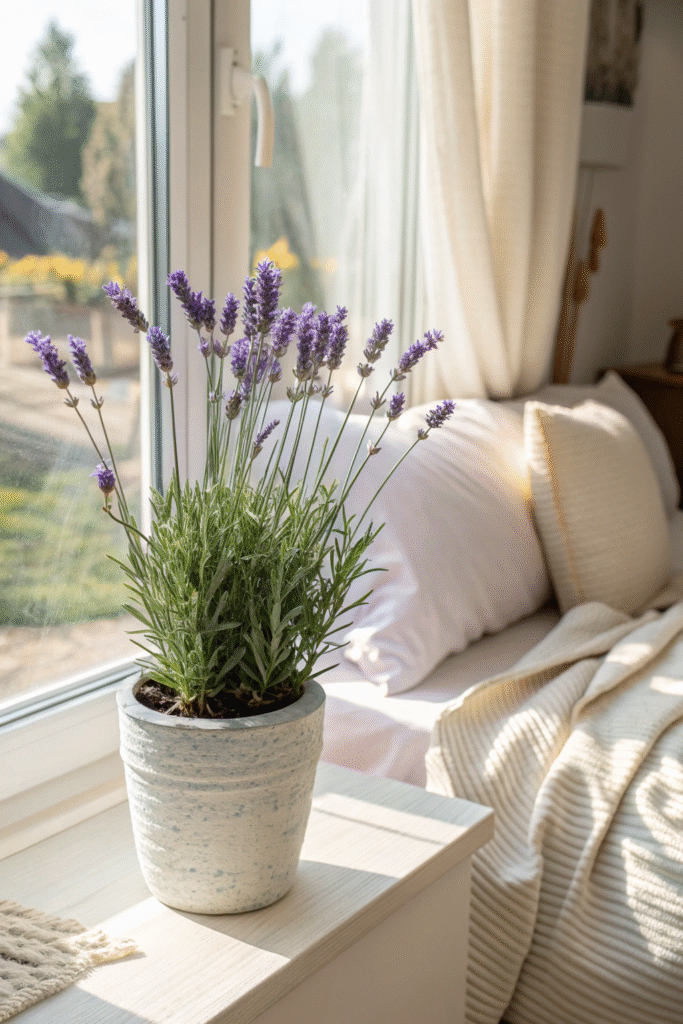
Lavender is world-famous for its calming scent, which has been shown to reduce heart rate, blood pressure, and stress. Keeping lavender in your bedroom helps promote relaxation and better sleep.
- Health benefits: Reduces stress and anxiety, improves sleep quality, and creates a spa-like environment.
- Care: Needs bright light for several hours a day. Water lightly; avoid soggy soil.
- Bedroom fit: Place on a sunny windowsill for both fragrance and beauty.
Aloe Vera
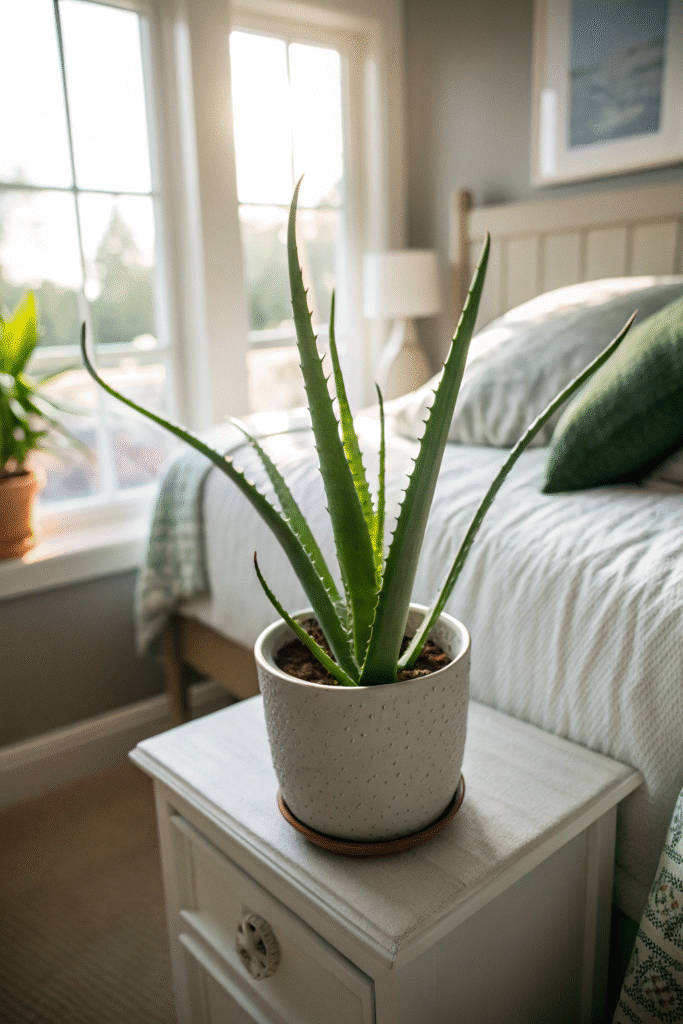
Aloe vera is more than a natural first-aid kit—it’s also an excellent nighttime oxygen booster. It’s especially useful in dry bedrooms since its thick leaves store water, meaning it needs very little care.
- Health benefits: Purifies air of formaldehyde and benzene. Nighttime oxygen release helps breathing. Gel can be used for burns and skin care.
- Care: Thrives in bright, indirect light. Water sparingly, about once every 2–3 weeks.
- Bedroom fit: Perfect for small bedside tables or shelves.
Areca Palm
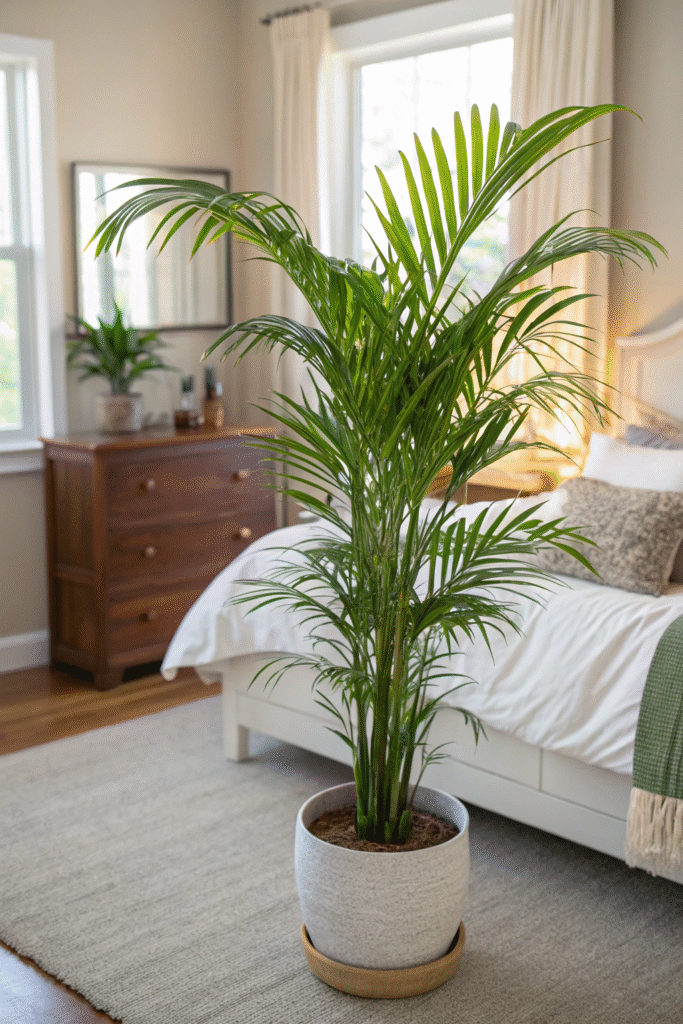
This tropical beauty doesn’t just brighten your space; it acts as a natural humidifier. It’s ideal for bedrooms in dry climates or during winter when heating systems dry out the air.
- Health benefits: Removes indoor air pollutants and adds moisture to the air, helping skin and breathing.
- Care: Prefers bright, indirect light. Needs regular watering but doesn’t like soggy roots.
- Bedroom fit: Works well in corners as a statement plant for larger bedrooms.
Pothos (Devil’s Ivy)
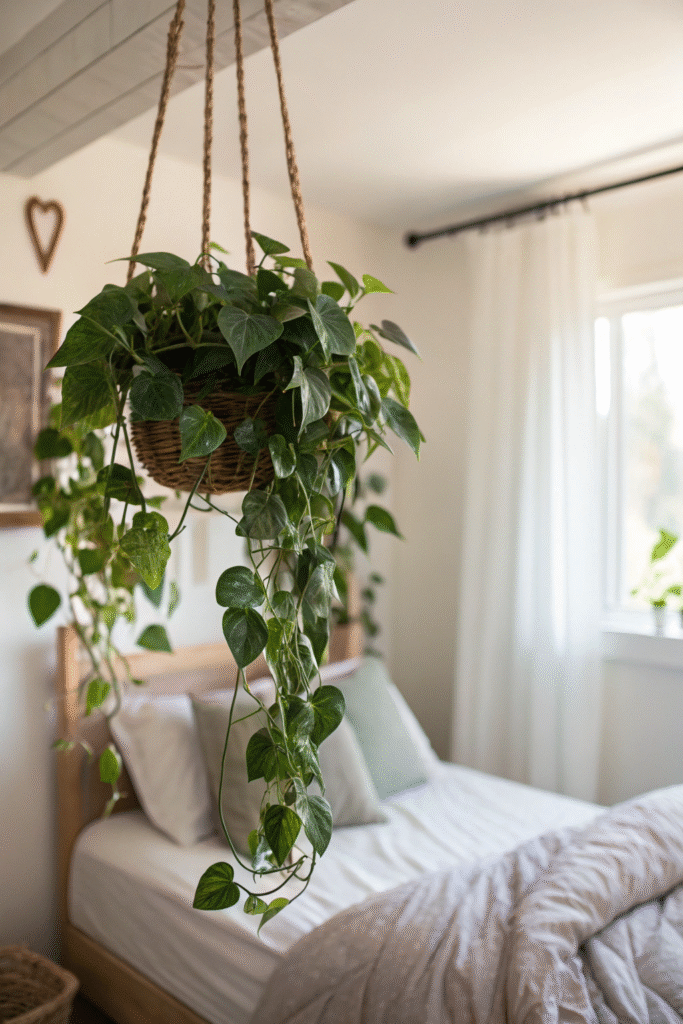
Pothos is one of the easiest plants to grow, making it perfect for beginners. Its trailing vines add a touch of greenery and movement, and it works hard to clean the air.
- Health benefits: Removes benzene, formaldehyde, and xylene. Improves overall indoor air quality.
- Care: Thrives in low to bright indirect light. Water when the top soil dries out.
- Bedroom fit: Beautiful in hanging baskets or high shelves where vines can cascade down.
Jasmine
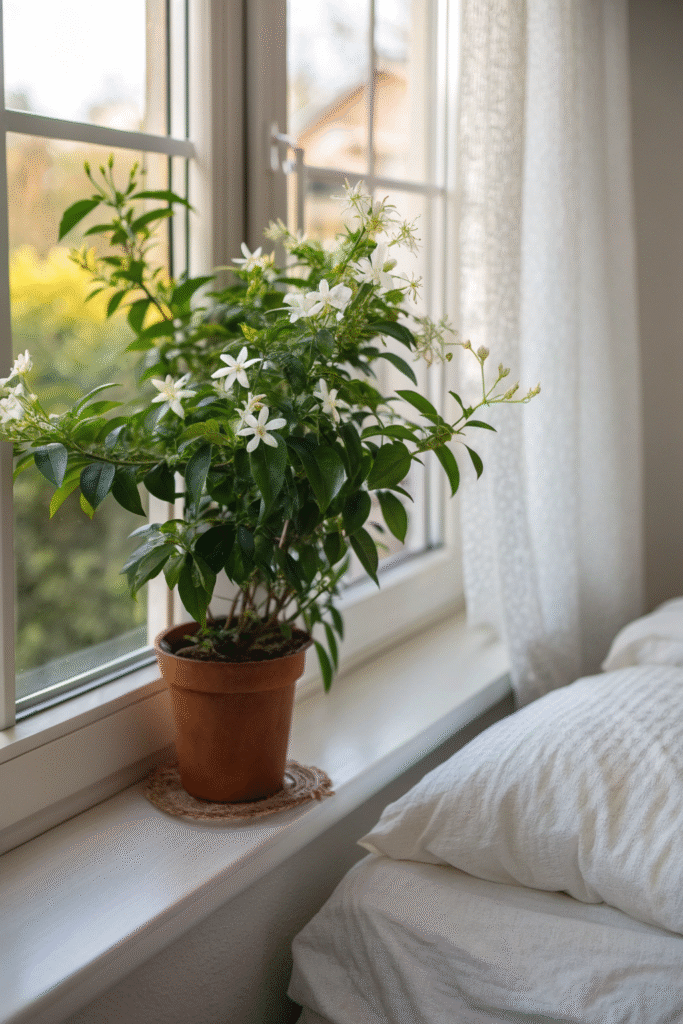
The delicate white flowers of jasmine give off a sweet fragrance known to promote relaxation. Studies show jasmine’s scent can reduce anxiety and improve sleep quality.
- Health benefits: Natural sleep aid, lowers stress, and enhances mood.
- Care: Needs bright, indirect sunlight. Keep soil slightly moist during the growing season.
- Bedroom fit: Place on a windowsill for fragrance to naturally circulate in the room.
Rubber Plant
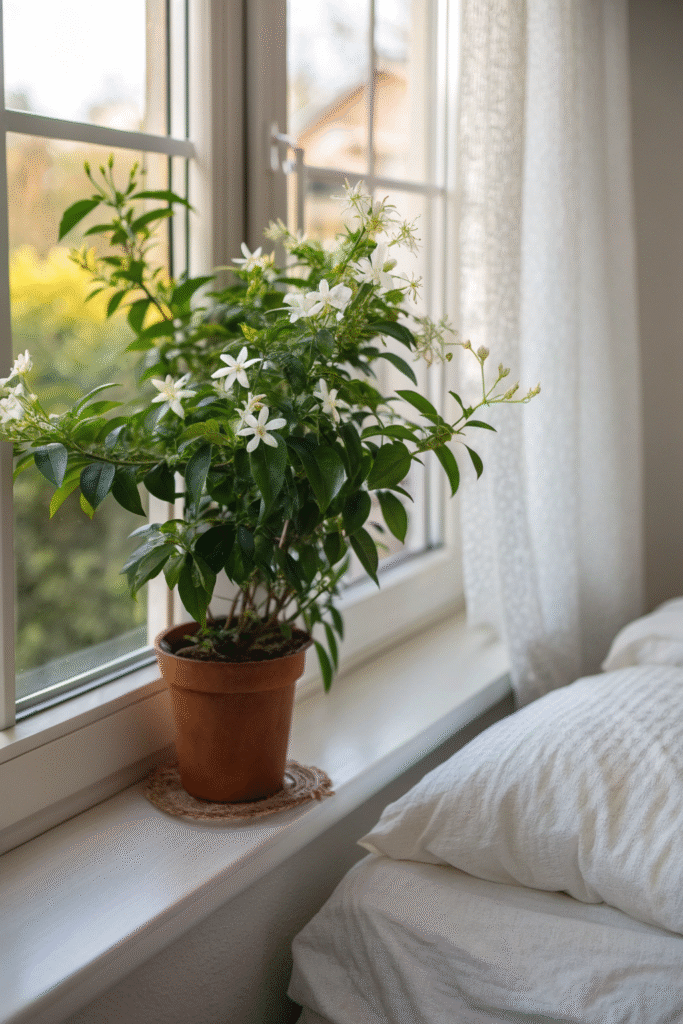
Rubber plants are not only visually striking with their large glossy leaves—they’re also strong air purifiers. They remove airborne toxins and add lush greenery to bedrooms.
- Health benefits: Removes formaldehyde from indoor air. Boosts overall air freshness.
- Care: Prefers bright, indirect light. Water weekly, allowing soil to partially dry.
- Bedroom fit: Great as a floor plant to fill empty corners.
Chamomile
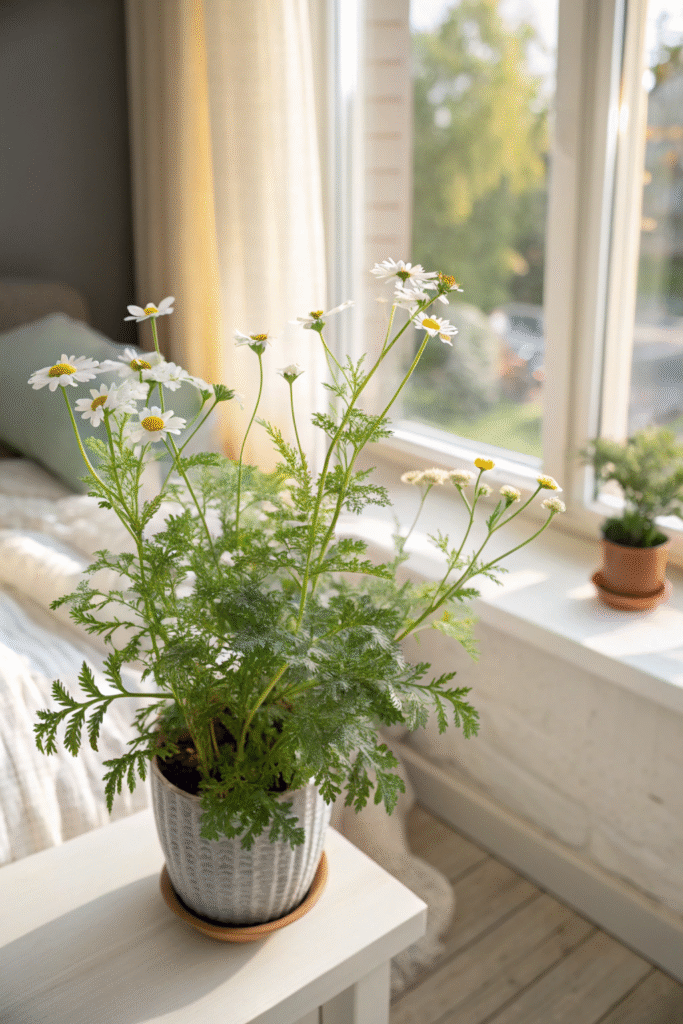
Chamomile is widely used in herbal teas for sleep, but the plant itself brings calming energy to a bedroom. While not a powerhouse air purifier, its soothing qualities are undeniable.
- Health benefits: Reduces stress and promotes relaxation with its gentle fragrance.
- Care: Needs plenty of light. Water regularly to keep soil moist.
- Bedroom fit: Best in smaller pots near sunny spots, complementing other air-purifying plants.
Spider Plant
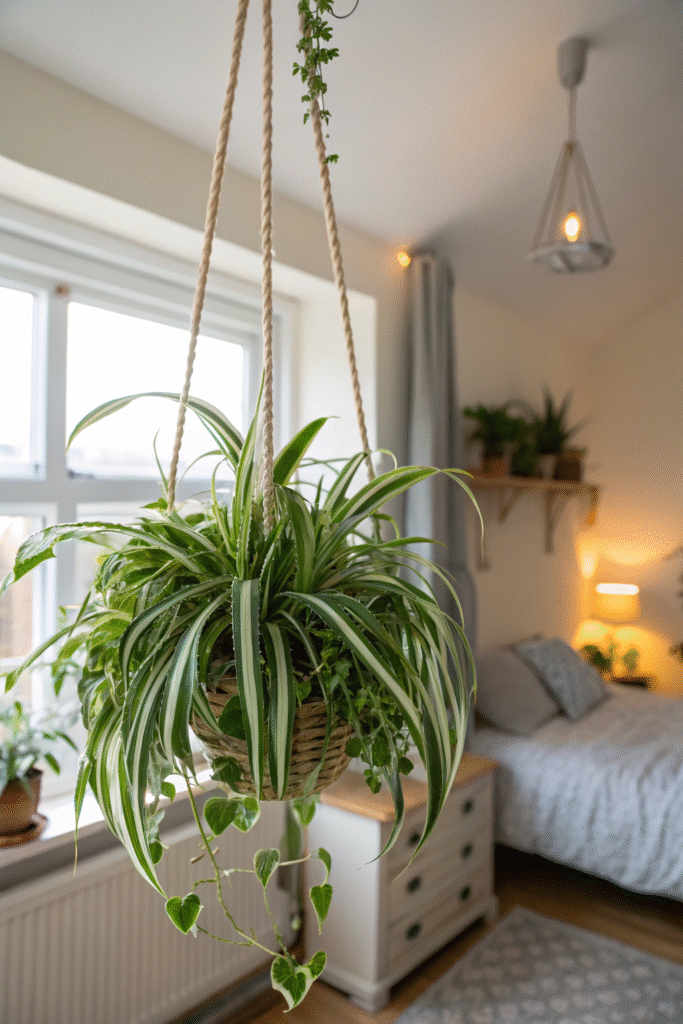
Spider plants are classic indoor favorites for good reason—they’re nearly indestructible and multiply easily with “spiderettes.” They absorb toxins like carbon monoxide and help freshen the air.
- Health benefits: Removes harmful pollutants and boosts indoor oxygen.
- Care: Thrives in bright, indirect light but tolerates low light. Water once a week.
- Bedroom fit: Looks great on shelves or hanging baskets.
Quick Comparison Table of Bedroom Plants
| Plant | Health Benefits | Light Needs | Watering | Best Spot in Bedroom |
| Snake Plant | Nighttime oxygen, toxin removal | Low–bright indirect | Every 2–3 weeks | Corner floor space |
| Peace Lily | Air humidifier, toxin remover | Medium indirect | Keep moist | Nightstand/dresser |
| Lavender | Stress relief, better sleep | Bright light | Light, well-drained | Sunny windowsill |
| Aloe Vera | Oxygen at night, skin aid | Bright indirect | Every 2–3 weeks | Bedside/shelf |
| Areca Palm | Humidifier, air purifier | Bright indirect | Regular | Corner accent plant |
| Pothos | Easy care, toxin removal | Low–bright indirect | When top soil dries | Hanging basket/shelf |
| Jasmine | Relaxation, sleep boost | Bright indirect | Slightly moist soil | Windowsill |
| Rubber Plant | Toxin removal, lush greenery | Bright indirect | Weekly | Floor corner |
| Chamomile | Stress relief, calming scent | Bright light | Regular | Small sunny pot |
| Spider Plant | Air freshener, easy grower | Bright–low indirect | Weekly | Hanging basket/shelf |
Final Thoughts
Bedroom plants aren’t just trendy decor—they’re natural wellness boosters. Some, like the snake plant and aloe vera, actively improve nighttime air quality. Others, like lavender and jasmine, create a calming environment that helps you drift off faster. By choosing the right mix of air purifiers and soothing aromatics, you can turn your bedroom into a healthier, more restorative space.






